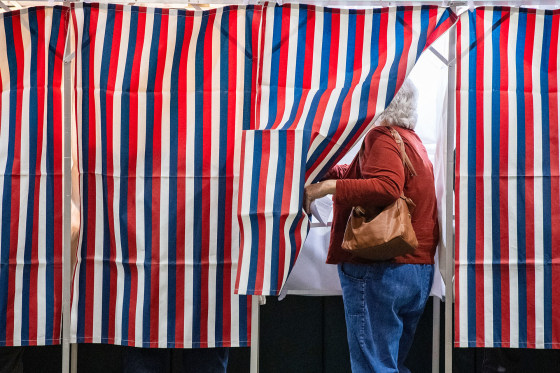WASHINGTON — The House passed a bill Thursday that would require proof of citizenship to register to vote in federal elections in an effort to codify one of President Donald Trump's executive actions in his second term.
Lawmakers approved the Safeguard American Voter Eligibility (SAVE) Act in a 220-208 vote, with four Democrats — Reps. Ed Case of Hawaii, Henry Cuellar of Texas, Jared Golden of Maine and Marie Gluesenkamp Perez of Washington — joining every Republican present in support of the measure.
The legislation, sponsored by Rep. Chip Roy, R-Texas, would amend the National Voter Registration Act so states would be required to obtain proof of citizenship in person from people who are registering to vote.
It would also require states to establish a program to remove undocumented immigrants from existing voter rolls and allow American citizens to sue election officials who don't follow proof-of-citizenship requirements.
"In order to preserve this republic, we must uphold what it means to be able to vote in a U.S. election," Roy said in a statement. "I am grateful that my colleagues answered the call and passed the SAVE Act, as this serves as a critical first step to ensure that we maintain election integrity throughout our country."
Election officials, voting rights advocates and Democrats have warned that the SAVE Act could disenfranchise millions of eligible voters who don’t have easy access to identification documents, in addition to women who changed their last names after marriage.
“My Republican colleagues crafted and passed one of the most damaging voter suppression bills in modern history. There’s no doubt that women, military members, and people of color will be disproportionately impacted," Rep. Joe Morelle, D-N.Y., the ranking member on the House Administration Committee, said in a statement. "The fight to stop this bill — to protect Americans’ sacred right to vote — is not over. I will do everything in my power to ensure every eligible American has access to the ballot box.”
The American Civil Liberties Union said in a news release Thursday that the bill would "threaten the voting rights of as many as 69 million women who have taken their spouse’s name but whose birth certificate does not match."
The bill's Republican sponsor argued that there's a system in place to address those concerns.
The Associated Press reported that Roy said: “We have mechanisms giving the state fairly significant deference to make determinations as to how to structure the situation where an individual does have a name change. The process is specifically contemplated in this legislation.”
It is already illegal for noncitizens to vote in federal elections, and the practice occurs rarely. Federal law requires that voters registering to vote swear under penalty of perjury that they are citizens and eligible to vote. And registering to vote and casting a ballot leaves a paper trail that elected officials are required by law to routinely review. Courts have blocked states from adding documentary proof-of-citizenship requirements for voters in federal races.
Trump and his GOP allies have zeroed in on the threat of noncitizens’ voting in elections as part of their broader unfounded claims of election fraud. Trump signed an executive order last month to require people to prove their citizenship when they register to vote. Democrats and voting rights groups have challenged the order in court.
The fate of the House's bill is uncertain in the Senate, where Mike Lee, R-Utah, unveiled a companion bill this year. With a 53-47 majority, Senate Republicans would need Democratic support to overcome the 60-vote threshold to advance the bill to a final vote and ultimately send it to Trump to sign into law. Lee's bill has 20 co-sponsors, all of whom are Republican.


